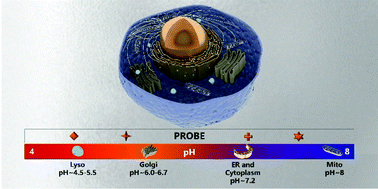Recent progress of organic small molecule-based fluorescent probes for intracellular pH sensing
Abstract
Fluorescent probes along with fluorescence microscopy are essential tools for biomedical research. Various cellular ubiquitous chemical factors such as pH, H2O2, and Ca2+ are labeled and traced using specific fluorescent probes, therefore helping us to explore their physiological function and pathological change. Among them, intracellular pH value is an important factor that governs biological processes, generally ∼7.2. Furthermore, specific organelles within cells possess unique acid–base homeostasis, involving the acidic lysosomes, alkalescent mitochondria, and neutral endoplasmic reticulum and Golgi apparatus, which undergo various physiological processes such as intracellular digestion, ATP production, and protein folding and processing. In this review, recently reported fluorescent probes targeted toward the lysosomes, mitochondria, endoplasmic reticulum, Golgi apparatus, and cytoplasm for sensing pH change are discussed, which involves molecular structures, fluorescence behavior, and biological applications.

- This article is part of the themed collection: Analyst Review Articles 2021


 Please wait while we load your content...
Please wait while we load your content...